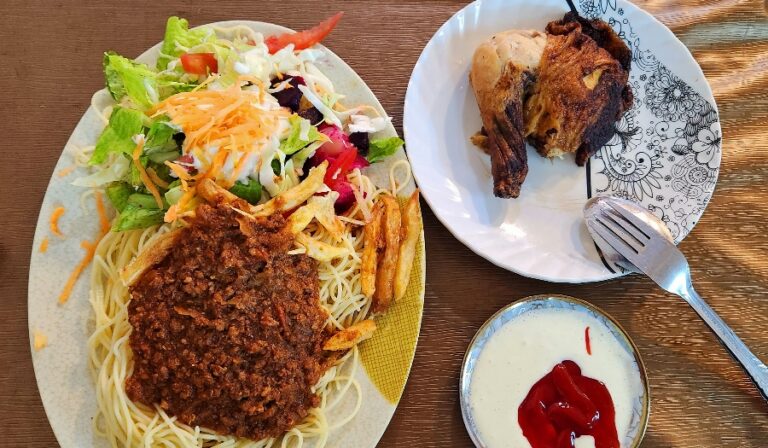Introduction: Djiboutian Cuisine
Djibouti, located in the Horn of Africa, has a rich and diverse cuisine that reflects its cultural history and geographical location. The cuisine is influenced by the Arabic, French, and African cultures that have interacted with the region for centuries. The cuisine is characterized by its spicy and aromatic flavors, and the use of staple foods such as rice, bread, and meat.
The Role of Food in Djiboutian Culture
Food plays an important role in Djiboutian culture, as it is a way of bringing people together and fostering social relationships. Eating together is a sign of respect, and hospitality is a highly valued virtue in Djiboutian society. In addition, traditional food is an important part of Djiboutian identity, and it serves to strengthen cultural ties and preserve cultural heritage.
Traditional Djiboutian Dishes and Ingredients
Some of the most popular traditional dishes in Djibouti include Skoudehkaris, a rice dish with vegetables and spices, and Lahoh, a type of pancake that is eaten with honey or butter. Djiboutian cuisine also features a variety of meats, including goat, camel, and beef. Other common ingredients include lentils, chickpeas, and potatoes. Spices such as cumin, coriander, and cardamom are also commonly used.
Influences on Djiboutian Cuisine: Arabic and French
Djiboutian cuisine has been influenced by the Arabic and French cultures that have interacted with the region. Arabic influences can be seen in the use of spices and the preparation of meat dishes, while French influences can be seen in the use of dairy products and bread. French baguette, for example, is a staple in Djiboutian cuisine and is often used for sandwiches or dipped into stews.
The Role of Hospitality in Djiboutian Food Culture
Hospitality is a highly valued virtue in Djiboutian society, and it is reflected in the importance placed on food. Guests are always served food and drinks, and host families go out of their way to ensure that their guests feel welcome and comfortable. In fact, there is a saying in Djiboutian culture that states “the guest is a gift from God,” emphasizing the importance of hospitality.
Food Rituals and Celebrations in Djiboutian Society
Food is an important part of celebrations and rituals in Djiboutian society. For example, weddings and other festive occasions are marked by the preparation and sharing of large, communal meals. Ramadan, the month-long Muslim fast, is also a time of community and sharing, with families coming together to break their fasts with traditional dishes such as Harira, a soup made with lentils and spices.
Djiboutian Street Food Culture
Djiboutian street food culture is vibrant and diverse, with vendors selling everything from Somali-style sambusas to French-style pastries. One of the most popular street foods in Djibouti is Fah-Fah, a spicy noodle soup made with meat and vegetables. Other popular street foods include grilled meats, roasted corn, and falafel.
Conclusion: The Importance of Food in Djiboutian Culture
In conclusion, food plays an important role in Djiboutian culture, serving as a way of bringing people together, preserving cultural heritage, and strengthening social relationships. Djiboutian cuisine is rich and diverse, reflecting the influences of Arabic, French, and African cultures. Whether enjoyed in a family home or purchased from a street vendor, food is an integral part of daily life in Djibouti.

